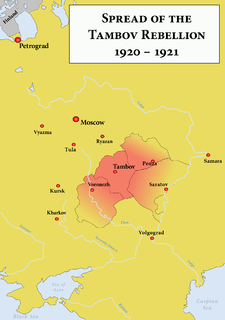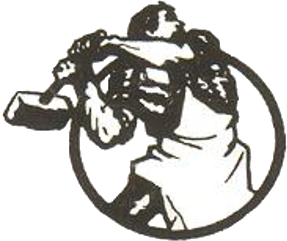
The Bolsheviks, also known in English as the Bolshevists, were a radical far-left Marxist faction founded by Vladimir Lenin and Alexander Bogdanov that split from the Menshevik faction of the Marxist Russian Social Democratic Labour Party (RSDLP), a revolutionary socialist political party formed in 1898, at its Second Party Congress in 1903.

Leninism is a political theory developed by Russian revolutionary Vladimir Lenin that proposes the establishment of the dictatorship of the proletariat, led by a revolutionary vanguard party, as the political prelude to the establishment of socialism. The function of the Leninist vanguard party is to provide the working classes with the political consciousness and revolutionary leadership necessary to depose capitalism in the Russian Empire (1721–1917). Leninist revolutionary leadership is based upon The Communist Manifesto (1848) identifying the communist party as "the most advanced and resolute section of the working class parties of every country; that section which pushes forward all others." As the vanguard party, the Bolsheviks viewed history through the theoretical framework of dialectical materialism, which sanctioned political commitment to the successful overthrow of capitalism, and then to instituting socialism; and, as the revolutionary national government, to realize the socio-economic transition by all means.

The October Revolution, officially known in Soviet historiography as the Great October Socialist Revolution and commonly referred to as the October Uprising, the October Coup, the Bolshevik Revolution, the Bolshevik Coup, or the Red October, was a revolution in Russia led by the Bolshevik Party of Vladimir Lenin that was instrumental in the larger Russian Revolution of 1917–1923. It took place through an armed insurrection in Petrograd on 25 October 1917.

The Russian Revolution was a period of political and social revolution across the territory of the Russian Empire, commencing with the abolition of the monarchy in 1917, and concluding in 1923 after the Bolshevik establishment of the Soviet Union, along with five other Soviet republics, Ukraine, Belarus, Armenia, Azerbaijan and Georgia, resulting in the end of the Civil War.

The State and Revolution (1917), by Vladimir Lenin, describes the role of the State in society, the necessity of proletarian revolution, and the theoretic inadequacies of social democracy in achieving revolution to establish the dictatorship of the proletariat.

The Tambov Rebellion, which occurred between 1920 and 1921, was one of the largest and best-organized peasant rebellions challenging the Bolshevik regime during the Russian Civil War. The uprising took place in the territories of the modern Tambov Oblast and part of the Voronezh Oblast, less than 300 miles southeast of Moscow.
"Dual Power" was a term first used by communist Bolshevik leader Vladimir Lenin (1870–1924), in the Pravda article titled "The Dual Power". which described a situation in the wake of the February Revolution, the first of two Russian Revolutions in 1917. Two powers coexisted with each other and competed for legitimacy: the Soviets, particularly the Petrograd Soviet, and the continuing official state apparatus of the Provisional Government of social democrats.
The Declaration of the Rights of the Peoples of Russia was a document promulgated by the Bolshevik government of Russia on November 15, 1917.

The July Days were a period of unrest in Petrograd, Russia, between 16–20 July [O.S. 3–7 July] 1917. It was characterised by spontaneous armed demonstrations by soldiers, sailors, and industrial workers engaged against the Russian Provisional Government. The demonstrations were angrier and more violent than those during the February Revolution months earlier.
Cecilia Samoylovna Bobrovskaya was an early Bolshevik activist, revolutionary, and memoirist. She played a notable role in various local organizations of the Bolshevik Party – consequently facing repeated persecution by the authorities of the Russian Empire. Bobrovskaya is best known for her memoirs, Twenty Years in Underground Russia: Memoirs of a Rank-and-File Bolshevik (1934).
In Russia, efforts to build communism began after Tsar Nicholas II lost his power during the February Revolution, and ended with the dissolution of the USSR in 1991. The Provisional Government was established under Prince Lvov, however, the Bolsheviks refused to accept the government and revolted in October 1917, taking control of Russia. Vladimir Lenin, their leader, rose to power and governed between 1917 and 1924. The Bolsheviks formed the Russian Soviet Federative Socialist Republic, or the Union of Soviet Socialist Republics, marking the beginning of the Russian Civil War between the revolutionary Reds and the counter-revolutionary Whites. In 1922 the Communist Reds were victorious and formed the Soviet Union. Lenin died in 1924, starting a power struggle which ended with Joseph Stalin seizing power. He was the leader of the Communist Party until 1953. He encouraged political paranoia and conducted the Great Purge to remove opponents of his dominance. Stalin died in 1953, and the Soviet Union went through "De-Stalinisation" under the new leader Nikita Khrushchev, though his attempts to improve the lives of ordinary citizens were often ineffective. Khrushchev ruled through the years of the Cold War. Leonid Brezhnev was appointed leader in 1964. Brezhnev governed the era without economic reforms, which led to a national economic decline by the mid-1970s.Yuri Andropov gained power in 1982 and tried to improve the economy by increasing management effectiveness but without making changes to the principles of a socialist economy. Andropov later died in 1984, fifteen months after gaining power.

The All-Russian Congress of Soviets evolved from 1917 to become the supreme governing body of the Russian Soviet Federative Socialist Republic from 1918 until 1936, effectively. The 1918 Constitution of the Russian SFSR mandated that Congress shall convene at least twice a year, with the duties of defining the principles of the Soviet Constitution and ratifying peace treaties. The October Revolution ousted the provisional government, making the Congress of Soviets the sole, and supreme governing body. It is important to note that this Congress was not the same as the Congress of Soviets of the Soviet Union which governed the whole Soviet Union after its creation in 1922.

The left-wing uprisings against the Bolsheviks, known in anarchist literature as the Third Russian Revolution, were a series of rebellions, uprisings, and revolts against the Bolsheviks by oppositional left-wing organizations and groups that started soon after the October Revolution, continued through the years of the Russian Civil War, and lasted into the first years of Bolshevik reign of the Soviet Union. They were led or supported by left-wing groups such as some factions of the Socialist Revolutionary Party, Left Socialist-Revolutionaries, Mensheviks, and anarchists. Generally, the uprisings began in 1918 because of the Bolshevik siege and cooptation of Soviet Democracy, the signing of the Treaty of Brest-Litovsk which many saw as giving huge concessions to the Central Powers, and opposition to Bolshevik socioeconomic policy. The Bolsheviks grew increasingly hard-line during the decisive and brutal years following the October Revolution, and would suppress any socialist opposition whilst also becoming increasingly hostile to intra-party opposition. These rebellions and insurrections occurred mostly during and after the Russian Civil War, until around 1924, though there did exist various small-scale insurgencies until World War 2.

The All Russian Constituent Assembly was a constitutional body convened in Russia after the October Revolution of 1917. It met for 13 hours, from 4 p.m. to 5 a.m., 18–19 January [O.S. 5–6 January] 1918, whereupon it was dissolved by the All-Russian Central Executive Committee, making the Third All-Russian Congress of Soviets the new governing body of Russia.

Julius Martov or L. Martov was a politician and revolutionary who became the leader of the Mensheviks in early 20th-century Russia. He was an old friend and mentor of Leon Trotsky, who described him as the "Hamlet of Democratic Socialism". Vladimir Lenin, his longtime political opponent, confessed in 1921 that his single greatest regret was "that Martov is not with us. What an amazing comrade he is, what a pure man!" According to his sister and fellow Menshevik, Lydia Dan, Martov had an "inexhaustible charm that attracted people". As a result, some commented it was frequently difficult to record why they followed him, and he confessed that "I have the nasty privilege of being liked by people".
The Mensheviks were one dominant faction in the Russian socialist movement, the other being the Bolsheviks.

Pitirim Alexandrovich Sorokin was a Russian, later American, sociologist and political activist, who contributed to the social cycle theory.
In the context of the theory of Leninist revolutionary struggle, vanguardism is a strategy whereby the most class-conscious and politically advanced sections of the proletariat or working class, described as the revolutionary vanguard, form organisations in order to draw larger sections of the working class towards revolutionary politics and serve as manifestations of proletarian political power against its class enemies.

Karl Johann Kautsky was a Czech-Austrian philosopher, journalist, and Marxist theoretician. Kautsky was recognized as one of the most authoritative promulgators of Orthodox Marxism after the death of Friedrich Engels in 1895 until the outbreak of World War I in 1914.

Anti-Leninism is opposition to the political philosophy Leninism as advocated by Vladimir Lenin.
















